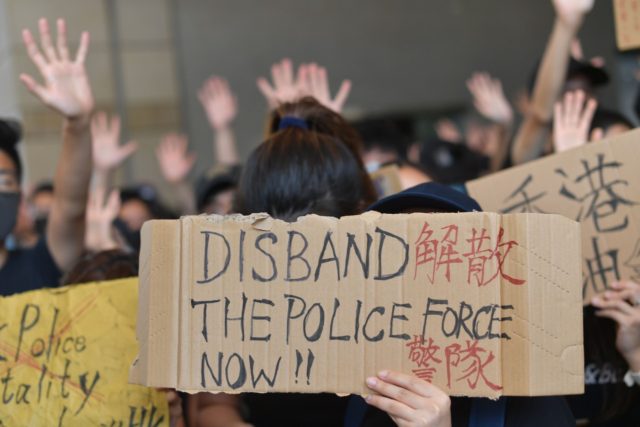The U.S. Senate unanimously passed the Hong Kong Human Rights and Democracy Act on Tuesday, a month after the House of Representatives did so, paving the way for President Donald Trump to sign it.
The bill will now head to conference committee to ensure that the House and Senate versions are identical before reading the president.
The Hong Kong act would require regular reviews of the human rights situation in the city as a requirement for it to keep its special trade status with the United States, which has helped it maintain its status as one of the most important trade hubs in the world. It also provides measures to help Hong Kong pro-democracy protesters keep travel rights to the United States in the event that Hong Kong police fabricate a criminal record against them.
Hong Kong has suffered months of unrest in light of increasingly belligerent attempts by the Chinese Communist Party to violate “One Country, Two Systems,” the policy that prevents China from taking away the city’s communist freedoms – and prevents Hong Kong from seeking independence. In June, Hong Kong lawmakers attempted to pass a law that would have allowed China to extradite anyone within Hong Kong, effectively imposing communist law in the region, to which millions of Hong Kong residents responded by taking the streets in peaceful protest.
The Hong Kong government formally withdrew the bill from consideration, but protesters are still demanding the right to elect all their lawmakers, freedom for political prisoners, an end to the government referring to them as “rioters” (a crime punishable by up to ten years), and an independent investigation into police brutality.
The Senate signed the Hong Kong act in the aftermath of an extremely violent weekend on Hong Kong’s Polytechnic University Campus, where police sealed off all exits to the campus and violently assaulted anyone attempting to leave as food and water supplies dwindled. Pro-democracy protesters set much of the campus on fire to protect themselves from tear gas and rubber bullet attacks, to little avail.
Defending Hong Kong from growing communist attacks has united the American Congress at a moment in which much of U.S. media alleges the nation’s leaders are polarized in an unprecedented fashion.
“Today, the United States Senate sent a clear message to Hong Kongers fighting for their long-cherished freedoms: we hear you, we continue to stand with you, and we will not stand idly by as Beijing undermines your autonomy,” Senator Marco Rubio (R-FL), the sponsor of the Senate bill, said following its passing.
#HongKong we hear you.
We continue to stand with you.
Tonight, the Senate ✔passed my #HongKongHumanRightsandDemocracyAct pic.twitter.com/ldUmjYk7yK
— Marco Rubio (@marcorubio) November 19, 2019
Rubio joined Sen. Jim Risch (R-ID) and two Democrats, Sen. Bob Menendez (D-NJ) and Sen. Ben Cardin (D-MD), in introducing the bill.
✅ PASSED — Hong Kong Human Rights and Democracy Act pic.twitter.com/HZVgJpfYoG
— Senator Bob Menendez (@SenatorMenendez) November 20, 2019
“With the situation in Hong Kong nearing a breaking point, this legislation will hopefully be a shot in the arm for the millions who have been patiently waiting for the U.S. to once again serve as a beacon of light & solidarity in their push to defend their basic rights & autonomy,” Menendez wrote on Twitter following the passage of the act.
The bill has received significant support from the Hong Kong protest movement. The anti-communist group Demosisto applauded the Senate on Tuesday for passing the bill.
The Senate just passed the #HKHRDA. Thank you everyone — in Hong Kong and Washington — for all the hard work.
— Demosistō 香港眾志 😷 (@demosisto) November 19, 2019
The secretary-general of Demosisto, the activist Joshua Wong, visited Congress in September to discuss the violent situation in Hong Kong, testifying before the Congressional-Executive Commission on China, a bicameral group of lawmakers. Wong has been arrested at least twice since his last visit to America and, this week, the Hong Kong government banned him from traveling to Europe, citing unresolved legal issues from his last arbitrary arrest.
The Chinese communist regime has repeatedly threatened Congress to obey Beijing and drop the bill.
“We strongly urge the U.S. to … stop its interference of any kind in Hong Kong affairs, stop advancing the bill, stop endorsing Hong Kong’s violent and radical forces and separatists, and stop abetting words and deeds that harm the prosperity of the special administrative region,” Foreign Ministry spokesman Geng Shuang told reporters in September.
Geng significantly elevated his outrage in a press release issued on Wednesday.
“This act neglects facts and truth, applies double standards and blatantly interferes in Hong Kong affairs and China’s other internal affairs,” Geng wrote, warning that Washington will face “negative consequences” and “strong countermeasures” from Beijing.
China’s state media outlets also demanded Congress abandon the bill.
“It is a self-destructive bargain as it is jeopardizing US companies and financial organizations in Hong Kong to threaten the Chinese government to compromise,” Shen Yi, a communist “expert,” told the state propaganda outlet Global Times.
The newspaper noted that the Communist Party mobilized the National People’s Congress, the Chinese People’s Political Consultative Conference, the Foreign Ministry, the Hong Kong and Macao Affairs Office, the Liaison Office, the Office of the Commissioner, and HK Special Administrative Region (SAR) government to issue anti-American statements following the bill’s passing.

COMMENTS
Please let us know if you're having issues with commenting.